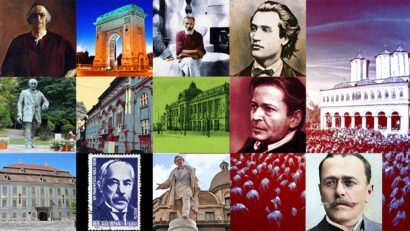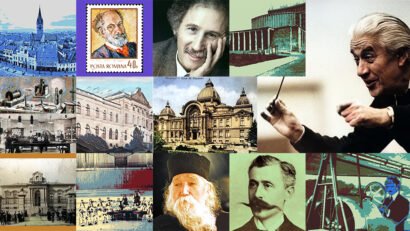The Sinaia Casino

Christine Leșcu, 15.07.2017, 14:02
On the road between Bucharest and Brasov, an old trade route
crossing the mountains, Sinaia developed in the 19th century as a
resort on Prahova Valley. It started with inns built for the traders traveling
between the two major urban centers. The development of the settlement was
boosted by the St. Nicholas monastery, documented since the 16th
century, and by the Sinai Monastery, set up in 1695. However, the most
important event for the development of the resort was the building of Peles
Castle, between 1875 and 1883 by the first king of Greater Romania, Carol I, as
the most beloved royal residence.
By early 20th century, Sinaia had
become one of the favorite vacation destinations for the inhabitants of Bucharest.
In 1912, a casino was built in the resort. The building, designed by architect
Petre Antonescu, is located in Dimitrie Ghica park, on the foundation of the
first villa built in the resort. The new building was erected very quickly,
probably because one of the main shareholders in the casino was the Baron of
Marcay, who was also a shareholder in the casino in Monte Carlo.
The manager of
the casino, Cristian Negulescu, told us about the history of the place:
The casino, emblematic for the town of Sinaia, was built
in just 7 months, in 1912. From its inauguration and until 1945, at the end of
WWII, the building hosted the casino, which was equipped with roulette tables
and various other games. It was designed to accommodate a large number of visitors,
and so the flow of gamblers was huge, especially on the weekend. It had 600 to
800 gamblers every day. Nowadays, the building is a location for cultural and
corporate events, both private and public, attracting thousands from every
corner of the world. Along the years, the building had many uses. During the
communist years, the casino was a cultural center for trade unions, like many
other historic buildings, and for a while it housed the town library. During
this time, the building housed school clubs, theater shows, traditional music
shows, and so on. In 1978 it became a building for protocol, and in 1990 it was
turned over to the Ministry of Culture. Only a few days later, it was turned
over to the Ministry of Tourism. In 1995, the casino was finally turned over to
the institution handling state protocol.
Today, the casino in Sinaia is a cultural institution, hosting
theater and classical music shows, art exhibitions and various other events.
The Sinaia Museum, one of the most recently built in the country, also hosts
arts exhibitions. Cristian Negulescu told us more about it:
The museum is
hosted by Stirbey Castle, an emblematic building dating back to 1875, the
oldest civilian building in Sinaia. It lies opposite to the town hall building,
in the center of the town. In December 2015, Town Hall restored the building
using its own funding, and the museum was inaugurated. Most exhibits were
donated by the citizens of the town, as a result of a local campaign to collect
objects with cultural and historical value for our town. We also have objects
donated by religious institutions, such as Sinai Monastery, and also by Peles
Castle.
Since its opening, in 2015, Sinaia Museum had no less than 5,000
visitors. Their number is sure to go up this summer, when the museum and the
casino will host events as part of the international music festival called
Enescu and World Music, taking place between August 7 and 30, 2017.





























